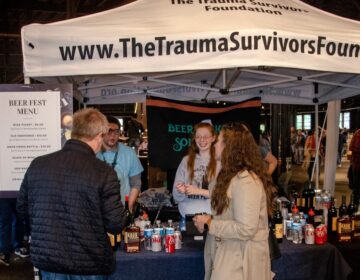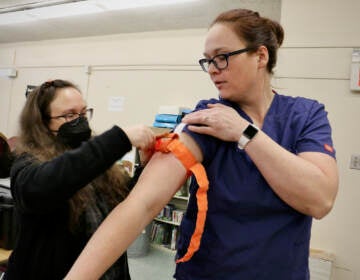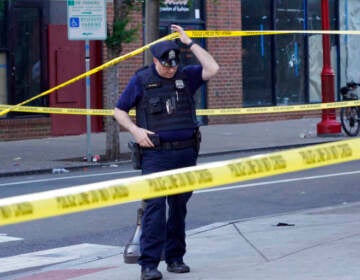After Starbucks arrests, Philly women of color reflect on racism’s effect on men in their lives
An event at the African American Museum in Philadelphia featured four black women's personal stories of racism's effect on the men in their lives.
-

Aja Graydon Dantzler, a singer-songwriter with the R&B group Kindred the Family Soul, discusses her father's complicated legacy at The African American Museum in Philadelphia on April 21, 2018. (Courtesy of Dan Papa with First Person Arts.)
-

WURD's Stephanie Renée looks on as audience members discuss strategies to handle difficult family relationships during an event at The African American Museum in Philadelphia on April 21, 2018. (Courtesy of Dan Papa with First Person Arts.)
-
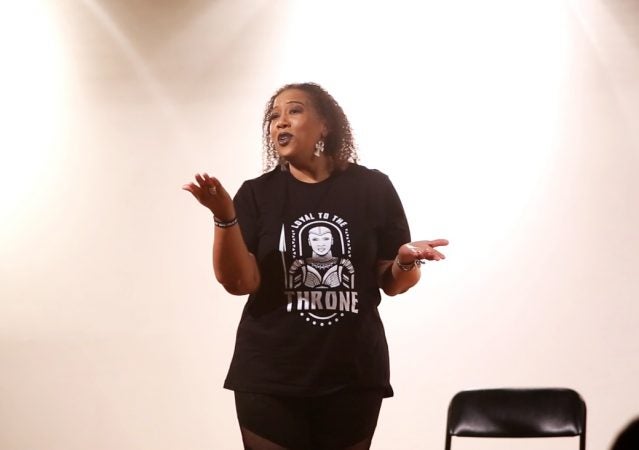
WURD's Stephanie Renée emceed the storytelling event at The African American Museum in Philadelphia on April 21, 2018. (Courtesy of Dan Papa with First Person Arts.)
-
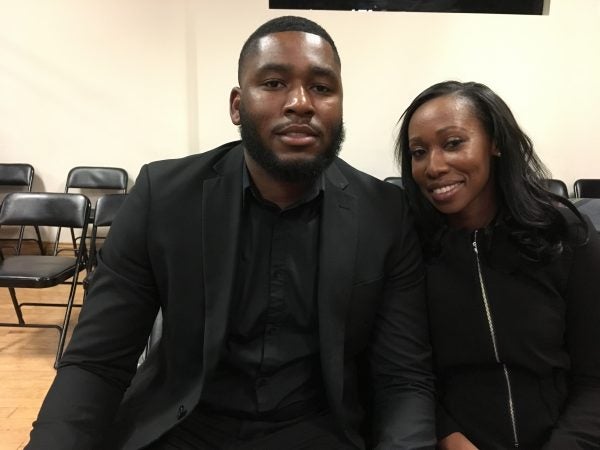
Dawon Matthews, left, and Kimberli Grasty attended the storytelling event at The African American Museum in Philadelphia on April 21, 2018. (Anne Hoffman/for WHYY)
When she was a little girl, Aja Graydon Dantzler’s mother worked hard to conceal her father’s problems from her, an effort to preserve her daughter’s ability to refer to her father with pride as her “daddy.”
But Graydon Dantzler’s father struggled with drug addiction and had affairs, which eventually led father and daughter to become estranged from one another.
Graydon Dantzler later found clarity when she says she accepted that her father was charming and kind, as well as difficult and evasive.
Before he died of cancer, Graydon Dantzler allowed her father back into her life, but she wishes he could have had more time with her children, his grandchildren, that they might have “sat at his feet.”
Graydon Dantzler was one of four women of color who told personal stories about their relationships with the men in their lives Saturday evening during an event at the African American Museum in Philadelphia, hosted by First Person Arts and the city’s Department of Behavioral Health and disAbility Services.
One by one, they told stories about how they, as women of color, love, nurture, and care for men of color — a group at an increased risk for violence, incarceration, and death.
“We find ourselves in a unique situation where we have a lot of racial trauma from being black or being people of color in general,” said Graydon Dantzler, a Philadelphia-based R&B singer-songwriter who headlined the show. “And then we also find ourselves being the most intimate partner with someone else who is also dealing with that, and we’re expected to be the person to facilitate that healing.”
Graydon Dantzler now views her father’s substance abuse and difficulty with intimate relationships through a historical lens: the trauma of growing up black in a segregated country still grappling with the legacy of slavery, while continuing to deal with racial bias as an adult. These factors made it harder for her father to break the cycles of poverty and incarceration, she said.
While the event had been planned for several months, the conversation was especially timely, given that it was just over one week after a video of two black men being arrested at a Starbucks in Center City went viral. The store manager called the police after she asked them to leave because they declined to make a purchase, which police said conflicts with Starbucks’ company policy.
Audience members and speakers reflected on the incident and agreed it served as a painful reminder that men of color still don’t enjoy certain freedoms that white people often take for granted.
Sharron Cooks spoke about the arrests in a poem she shared.
“My black men could be the ones to be arrested at a Starbucks or shot holding an iPhone mistaken for a gun,” she said, and the audience clapped loudly in recognition. “Thank you to my black men. You are appreciated. You are loved.”
There were stories of lost brothers, absent fathers, dutiful husbands, and men who persist, despite the very real barriers stacked against them — stories of love and loss, deep fear but also deep tenderness. The audience responded with knowing affirmations, silent snaps, and nods. This event, said one audience member, “was ordained.”
“I haven’t been the easiest man of color to love,” admits Roland Lamb, deputy commissioner with the city’s Department of Behavioral Health. The pressures of racism and inequality become additional barriers that families of color have always had to overcome in the already difficult process of nurturing relationships and caring for children, he said.
“The issue is that there’s a certain amount of stress that pervades how we live, who we live with,” said Lamb. “Those tensions don’t go away.”
That can also create hardship and stress for women of color, and some women on stage and in the audience remarked on how few men were in attendance.
Dawon Matthews was one of a handful who did. Matthews said it was his idea to come to the event with his partner, Kimberli Grasty.
“There’s pressure. When you look on the news, and you see another person who looks like you get killed, it’s always going to be pressure,” Matthews said.
And that pressure, he said, shows up in relationships with family, spouses, and friends.
For Graydon Dantzler, the path to healing those frayed relationships and coping with those stressors includes events like these, where women of color can come together and talk openly about their experiences.
“It sends us back to this very complicated relationship better armed and equipped to deal with it,” she said.
WHYY is your source for fact-based, in-depth journalism and information. As a nonprofit organization, we rely on financial support from readers like you. Please give today.


